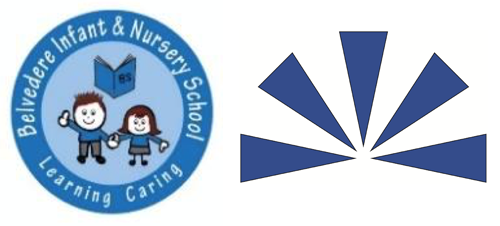Home | Learning | Curriculum | Subjects | Mathematics
Mathematics
Home | Learning | Curriculum | Subjects | Mathematics
Mathematics
Two
Schools
One
Vision
Maths
Maths Rationale
White Rose Maths Curriculum

BJS Curriculum
Calculation policy
Vocabulary progression
Belvedere Infant and Junior School mathematicians are thinkers and problem solvers. We will use our prior mathematical knowledge to make connections between different areas of mathematics, enabling us to reason effectively. We can use different manipulatives, resources and diagrams to explain and develop our understanding of mathematical concepts.
We teach the full National Curriculum. We have adapted the White Rose Maths scheme to meet the needs of the children at Belvedere Infant and Junior Schools. We have a mastery approach to the teaching of Mathematics https://whiterosemaths.com/
A mathematical concept or skill has been mastered when a pupil can represent it in multiple ways, has the mathematical language to communicate related ideas, and can independently apply the concept to new problems in unfamiliar situations.
Mastery is a journey and long-term goal, achieved through exploration, clarification, practice and application over time. At each stage of learning, pupils should be able to demonstrate a deep, conceptual understanding of the topic and be able to build on this over time.
This is not about just being able to memorise key facts and procedures, which tends to lead to superficial understanding that can easily be forgotten. Pupils should be able to select which mathematical approach is most effective in different scenarios.
whereby topics are taught in depth over a longer period. This allows for the mastering of concepts before moving on to the next sequence. This we believe paves the way for children to be secure in what they have learnt.
Planning
Teachers in all year groups plan using the White Rose scheme as the basis for most of their work, adapting resources to support the children where needed. Teachers also use the NCETM mastery documents to provide children with reasoning and problem solving questions. We aim, wherever possible, for children to access the work from their own year group. Occasionally, there may be a small number of children for whom this is not appropriate. They will look at earlier year groups if this is the case. Children who have achieved mastery with greater depth will be challenged and have their learning extended through problem solving questions from the NCETM.
Planning a Lesson
When planning a lesson, teachers need to plan for a balance of conceptual understanding, language and communication and mathematical thinking to support children’s mathematical problem solving. If a pupil has meaningful understanding of the maths they are learning, they will be able to represent it in different ways, use mathematical language to communicate related ideas and think mathematically with the concept. This will enable them to apply their understanding to a new problem in an unfamiliar situation. Within every unit, each lesson will build upon the last which enables children to link their new learning to prior concepts.
Multiple representations for all
Objects, pictures, words, numbers and symbols are everywhere. The White Rose approach incorporates all of these to help pupils explore and demonstrate mathematical ideas, enrich their learning experience and deepen understanding. Together, these elements help cement knowledge so pupils truly understand what they’ve learnt.
Concrete – Students should have the opportunity to use concrete objects and manipulatives to help them understand and explain what they are doing; for example cubes.
Pictorial – Students should then build on this concrete approach by using pictorial representations. These representations can then be used to reason and solve problems.
Abstract – With the foundations firmly laid, students should be able to move to an abstract approach using numbers and key concepts with confidence.
Fluency, reasoning and problem solving
Fluency
Pupils should be able to recall and apply mathematical knowledge both rapidly and accurately. However, it is important to stress that fluency often gets confused for just memorisation – it is far more than this. Pupils should be able to recognise relationships and make connections in mathematics.
Reasoning
The way pupils speak and write about mathematics transforms their learning. Mastery approaches, such as White Rise, use a carefully sequenced, structured approach to introduce and reinforce mathematical vocabulary. Pupils explain the mathematics in full sentences. They should be able to say not just what the answer is, but how they know it’s right. This is key to building mathematical language and reasoning skills.
Problem solving
Mathematical problem solving is at the heart of our approach. Pupils are encouraged to identify, understand and apply relevant mathematical principles and make connections between different ideas. This builds the skills needed to tackle new problems, rather than simply repeating routines without a secure understanding.
Mathematical concepts are explored in a variety of representations and problem-solving contexts to give pupils a richer and deeper learning experience. Pupils combine different concepts to solve complex problems, and apply knowledge to real-life situations.
Early Years
In the Early Years, maths concepts are explored using a multi-sensory and practical approach and, as much as possible, across the Early Years curriculum. By the end of Reception, children should be able to:
- use everyday language to talk about size, weight, capacity, position, distance, time and money to compare quantities and objects and to solve problems.
- recognise, create and describe patterns.
- explore characteristics of everyday objects and shapes and use mathematical language to describe them.
- count and order reliably numbers from 1 to 20, place them in order and say which number is one more or one less than a given number.
- add and subtract two single-digit numbers and count on or back to find the answer.
- solve problems, including doubling, halving and sharing.
We aim daily for short adult-led focused inputs which can either be for the whole class or groups. This does not have to be formal and can include number rhymes, songs, and games as well as suggested prompts for learning from White Rose Maths. The children also have regular opportunities to practise their counting and subitising skills and revisit prior learning.
These inputs can be followed up with short adult-led activities 2/3 times each week. Opportunities to practise new skills through play are encouraged in different areas of the provision either independently or with adult support.
Times Tables
Learning number facts for multiplication and division supports children’s learning and increases fluency and speed.
At Belvedere Junior School, we use Times Table Rockstars to develop fluency and speed of recall with basic facts of multiplication up to 12 x 12 and their corresponding division facts. Children in Year 4 will sit a statutory assessment called the ‘Multiplication Tables Check’



